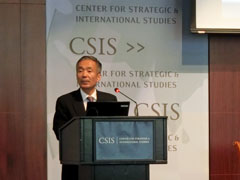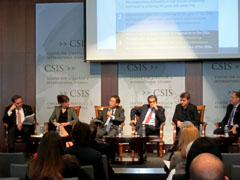CSIS and JICA-RI Hold a Launch Event in Washington, DC
2017.10.13
On September 11, 2017, the Center for Strategic and International Studies (CSIS) and the JICA Research Institute (JICA-RI) held an event in Washington, DC to launch their new joint report, “Harnessing the Data Revolution to Achieve the Sustainable Development Goals: Enabling Frogs to Leap,” which analyzed the challenges and opportunities inherent in the data development revolution to achieve the Sustainable Development Goals (SDGs).
The event was attended by representatives from CSIS and JICA as well as other representatives working on data innovation approaches from the private and public sectors. The event began with opening statements from Daniel F. Runde, Director of the CSIS Project on Prosperity and Development, and Naohiro Kitano, Director of JICA-RI, about the report and progress on current research.
In his speech, Kitano discussed the influence of data on development practices, stating that the “Data revolution was allowing governments, companies, researchers, and citizens to monitor progress and drive action, often with real-time, dynamic, disaggregated data.” He also highlighted the need for developing countries to build domestic institutional capacity so as to be able to use and maintain these new technologies.
Kitano then introduced a few JICA project case studies from Myanmar, Laos and some other countries that had harnessed leapfrog data technologies. The first was “The Vientiane Bus Project” in Laos, in which data such as bus traffic operating status and bus travelling speeds were gathered from GPS-equipped smartphones installed on the city buses to improve the efficiency of bus operations. The second case introduced was also from Laos called “Reducing Emissions from Deforestation and Forest Degradation (REDD+),” which used satellite technology to monitor deforestation and create a forest database. A third case study, the “Development of a Comprehensive Disaster Resilience System and Collaboration Platform in Myanmar,” was harnessing the power of scenario analysis systems to assess the vulnerabilities of certain areas to potential disasters in Myanmar.

Naohiro Kitano, Director of JICA-RI
Kitano concluded his speech by summarizing the report's recommendations, as follows: 1. Do not fixate on big data, as small data is good as well; 2. Capacity building is the key; 3. Share good practices; 4. Increase funding for the data revolution; 5. Stakeholder coordination is needed; and 6. Secure a consensus on data sharing, ownership, and privacy-related international standards.
In the following armchair discussion between Runde and Kitano, Kitano said that it was timely and significant to discuss this topic as the US and Japan were leading the world in data technologies. In response to Runde’s question on JICA’s efforts, Kitano explained that JICA’s new mission statement, which had been announced this year, stated that as innovation was one of its core actions, JICA aimed to leverage its strengths and long capacity building experience to encourage innovations that could have an unprecedented impact on the developing world.
A panel discussion followed, which began with Melamed’s role in the data revolution and the importance of global partnerships in utilizing a range of sources to collect data to support achieving the SDGs. Kenichi Konya, Senior Director of SDGs Mainstreaming team at JICA, then gave some examples of recent projects that had taken advantage of data technologies, such as a project that monitored fetus health in pregnant women to reduce infant mortality rates.
Alex Attal, Head of Digital Services and Head of Business Application Services for Fujitsu America, followed with a brief overview of the historical progress that had been made in data and information systems and addressed the scale involved in building an intelligent society as data continued to grow at an exponential rate. Shawn Dolley, Industry Leader from Health and Life Sciences at Cloudera, then shared his perspectives on the values to be gained from partnering with technology companies and empowering young people to apply their skills in software and technology toward meaningful projects. The final panelist to speak, Paul Zeitz, Former Director of Data Revolution for Sustainable Development Goals from the US Department of State, shared how the government had responded to these sustainable development agendas and how these goals were being adopted at the local level. Runde moderated both the roundtable and panel discussions, asked follow-up questions, and facilitated the question and answer session with the audience.

The event attracted representatives from a range of sectors
The data revolution has become a valuable opportunity to tap into information that could improve data systems for health, education, and many other projects. The international development community and private sector are partnering to create mechanisms that connect and implement data innovations to benefit communities around the world.
External Link

事業事前評価表(地球規模課題対応国際科学技術協力(SATREPS)).国際協力機構 地球環境部 . 防災第一チーム. 1.案件名.国 名: フィリピン共和国.

事業事前評価表(地球規模課題対応国際科学技術協力(SATREPS)).国際協力機構 地球環境部 . 防災第一チーム. 1.案件名.国 名: フィリピン共和国.

事業事前評価表(地球規模課題対応国際科学技術協力(SATREPS)).国際協力機構 地球環境部 . 防災第一チーム. 1.案件名.国 名: フィリピン共和国.

事業事前評価表(地球規模課題対応国際科学技術協力(SATREPS)).国際協力機構 地球環境部 . 防災第一チーム. 1.案件名.国 名: フィリピン共和国.

事業事前評価表(地球規模課題対応国際科学技術協力(SATREPS)).国際協力機構 地球環境部 . 防災第一チーム. 1.案件名.国 名: フィリピン共和国.
scroll